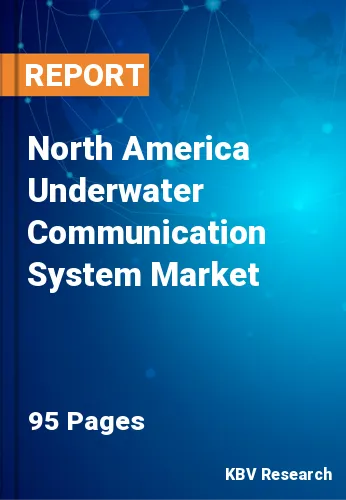The North America Underwater Communication System Market would witness market growth of 9.5% CAGR during the forecast period (2022-2028).
Marine operations including underwater exploration, environmental monitoring, and data collection all benefit from underwater wireless communications. Due to the distinct and extreme conditions that define underwater channels, underwater wireless communications present significant challenges. High amplification, multipath dispersion, and insufficient resource utilization are a few examples of these circumstances.
However, cutting-edge communication methods using electromagnetic, optical, and/or acoustic waves have arisen to address the theoretical and practical difficulties of underwater communications. Modern approaches to future underwater networks and communications have recently drawn the interest of numerous academic and industrial researchers.
Military, businesses, and the scientific community all are significantly adopting underwater communication systems. There are more underwater autonomous vehicles or devices deployed to support all of these tasks, which calls for high bandwidth along with a high capacity for information transfer. Due to its ability to deliver high data speeds with little power and bulk requirements, underwater communication has recently gained more attention for use in terrestrial, space, and underwater networks.
Due to a vast range of physical processes in varied underwater locations, from shallow coastal waters to deep seas or oceans, reliable underwater communication is primarily difficult. Developing technology to comprehend wireless communication underwater is the underwater communication system.
The underwater communication system market in the region is growing as a result of the rising utilization of this technology within the scientific research and development sector. In order to sustain research and development (R&D) activities, companies in the Scientific Research and Development industry mostly rely on government funding. Nevertheless, private investment has grown increasingly important in recent years. As a result, research firms have been obliged to depend more and more on private funding, which has increased as corporate earnings and business activity have increased.
The US market dominated the North America Underwater Communication System Market by Country in 2021; thereby, achieving a market value of $1,343.1 million by 2028. The Canada market is experiencing a CAGR of 12% during (2022 - 2028). Additionally, The Mexico market would exhibit a CAGR of 11% during (2022 - 2028).
Based on Component, the market is segmented into Hardware, Software, and Services. Based on Application, the market is segmented into Environmental Monitoring, Climate Monitoring, Hydrography, Oceanography, Pollution Monitoring, and Others. Based on End User, the market is segmented into Scientific Research & Development, Marine, Military & Defense, Oil & Gas, and Others. Based on Connectivity, the market is segmented into Wireless and Hardwired. Based on countries, the market is segmented into U.S., Mexico, Canada, and Rest of North America.
Free Valuable Insights: The Global Underwater Communication System Market is Estimated to reach $5.5 Billion by 2028, at a CAGR of 10.1%
The market research report covers the analysis of key stake holders of the market. Key companies profiled in the report include Thales Group S.A., Kongsberg Group, Saab AB, L3Harris Technologies, Inc., Teledyne Technologies, Inc., Ultra-Electronics Holdings plc, Sonardyne International Ltd., DSPComm, Undersea Systems International, Inc. and Sea and Land Technologies Pte Ltd.
By Component
By Application
By End User
By Connectivity
By Country
Our team of dedicated experts can provide you with attractive expansion opportunities for your business.

